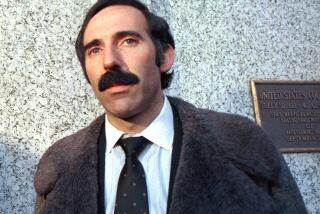Record Promoter Indicted on 165 ‘Payola’ Charges
- Share via
A federal grand jury in Los Angeles on Thursday indicted independent record promoter Ralph Tashjian on 165 counts of illegal “payola” payments to radio stations.
The action came only weeks after a federal judge rejected a plea agreement with Tashjian on similar charges filed early last year because his wife complained she had been coerced with the threat of new criminal charges against her husband.
In a separate indictment, Valerie Tashjian was charged with three counts of tax evasion stemming from her work as a bookkeeper in her husband’s record promotion business.
The new indictments, like the original charges, allege that Tashjian bribed radio station program directors with cash and cocaine to include his clients’ records on airplay lists.
Defense lawyers said they would immediately move to dismiss the indictments, complaining that the new charges were “vindictive” and based on Valerie Tashjian’s reluctance to plead guilty to save her husband.
Tashjian faces an additional 162 years in prison if convicted on all counts in the new indictment, though he had struck an earlier plea bargain with the government in which he would have pleaded guilty to counts that carried only up to nine years in prison, said his lawyer, Anthony P. Brooklier.
“We’re dealing with 162 years. There may not even be rock ‘n’ roll in 162 years,” Brooklier said.
But government lawyers said the new indictments cover the same scope of alleged illegal activity detailed in an original indictment returned last year.
Original Indictment
The original indictment, which will be replaced with the new one, charged Ralph Tashjian with three counts each of payola and tax evasion, one count of obstruction of justice and one count of conspiracy to distribute cocaine. Valerie Tashjian was originally charged with three similar tax counts.
To meet U.S. District Judge Pamela Ann Rymer’s concern that the earlier payola indictment was not specific enough, the new indictment simply breaks the activity down into individual transactions, said John Newcomer, head of the Justice Department’s Organized Crime Strike Force in Los Angeles.
“The reason we returned the superseding indictments was to address the concerns of the court, and not for any other reason,” Newcomer said.
The new indictments cap several weeks of behind-the-scenes legal maneuvering in which the Tashjians have negotiated to plead guilty to reduced criminal charges and prosecutors have sought to secure Ralph Tashjian’s cooperation in a widening probe of payola throughout the record industry.
It has underscored, say attorneys on both sides, the difficulties of mounting a criminal case against a husband and wife, whose individual legal rights must be protected by the court but who may be motivated to protect each other as well.
Both Tashjians had reached an agreement to plead guilty to reduced charges earlier this year, but the agreement fell apart when Valerie Tashjian broke into tears as she was entering her plea and proclaimed her innocence, saying she was pleading guilty only to save her husband from the threat of more serious criminal charges.
Government prosecutors claimed that all parties knew from the beginning that Ralph Tashjian would be allowed to plead guilty only if his wife did so as well. To do otherwise, they said, would allow Tashjian to attempt to exonerate his wife at trial by testifying on her behalf.
Useless Testimony Feared
If prosecutors then attempted to attack the credibility of his testimony, he would be rendered useless as a witness against other targets of the payola investigation in future trials, Richard Stavin, strike force attorney, argued in court papers.
The judge complained that the structure of the plea bargain--with a wife required to plead guilty along with her husband--set up an “implicitly coercive situation,” and she refused to accept the pleas.
Prosecutors admitted it was difficult to place a husband and wife on trial together, but insisted that there was strong evidence that Valerie Tashjian was guilty of the alleged tax offenses.
The prosecutors added in their papers: “The government must necessarily make prosecutorial decisions that in the light of human emotions may appear to be abhorrent and offensive. To not make these difficult decisions by allowing emotion and human sentimentality to determine who is prosecuted and who is not would undermine the legal tenet that justice is blind.”
But Valerie Tashjian’s lawyer, David E. Kenner, argued in his court papers that the government has been “angered and embarrassed” by his client’s revelations about the plea negotiations and was returning the new indictment “in an effort to punish” her.
More to Read
Sign up for Essential California
The most important California stories and recommendations in your inbox every morning.
You may occasionally receive promotional content from the Los Angeles Times.











